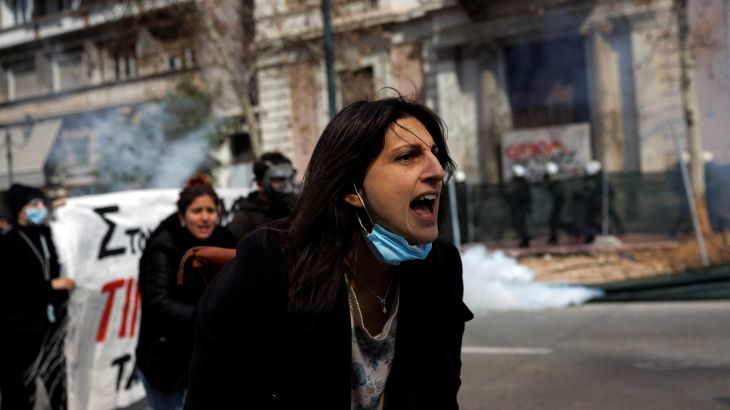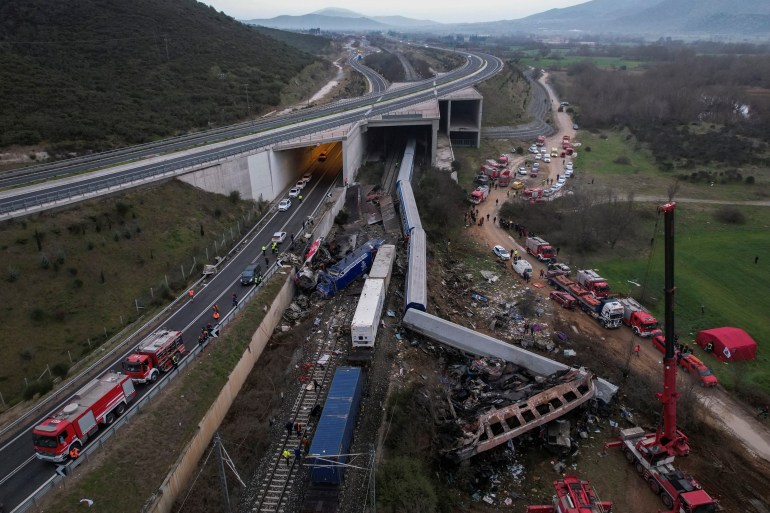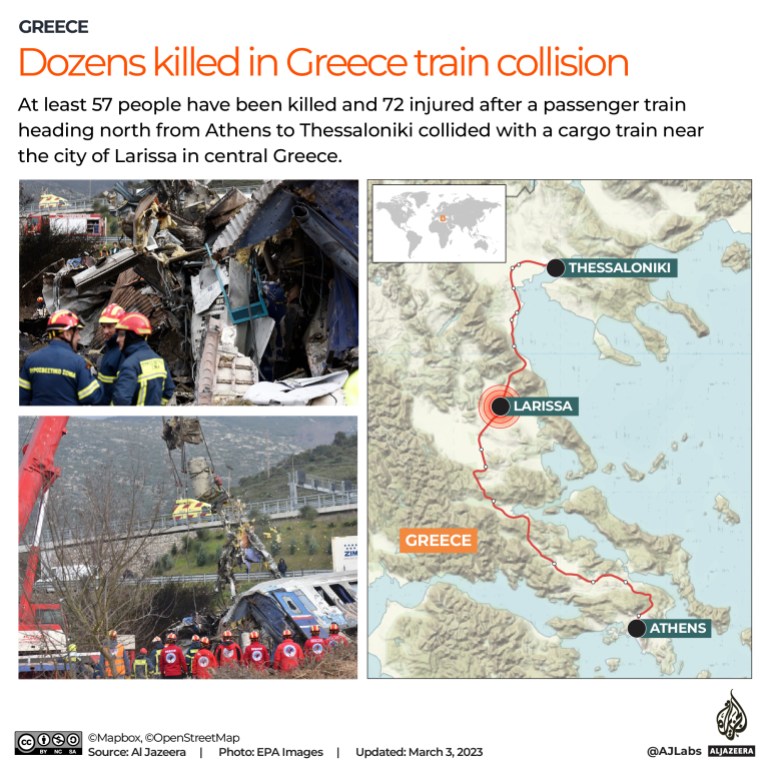Sorrow gives way to anger in Greece’s worst ever train crash
Many of the 57 people who died in Greece’s train accident were young, sparking fury across the country.

Larissa, Greece – Relatives of those killed in Greece’s worst-ever train accident stood in silence at the Larissa General Hospital amphitheatre, normally used for doctors’ seminars.
As they listened to the deputy health minister tell them how they were to give DNA samples that would be used to match the DNA of body parts recovered from the crash scene, they did not speak, and barely registered facial expressions. They walked silently in small groups as their names were called.
Most were couples in their 40s and 50s – perhaps the parents of the many registered missing children.
One woman held her head in her hands and stared blankly ahead.
That so many of the 57 confirmed dead and 56 missing in the February 28 disaster were young has touched a nerve with Greeks.
Some victims had been returning to their universities after a long weekend celebrating Greek Orthodox lent.
Twin sisters Thomi and Chrysa Plakia, 20, and their first cousin, 19-year-old Anastasia Plakia, were returning to their university studies in Thessaloniki when their train, the InterCity 62, slammed into an oncoming freight train at an estimated combined speed of 280km/h. All three women were killed.
Their hometown of Kastraki was steeped in mourning, said restauranteur Eleftheria Polyzou.
“We pass each other on the street. Our eyes meet, and nobody knows what to say,” she said.
Sorrow has spilled over into rage in this society, where nuclear family bonds are nothing short of sacred.
The Larissa stationmaster has confessed to sending train 62 north on the southbound track, but many Greeks do not believe he was the only one to blame.
“It’s not just the stationmaster, it’s not just his human error of not switching the tracks, it’s everything that happened for 20 years before that,” said Andreas Samartzis, a Larissa restauranteur.
“When you’re a father, you feel everything twice as intensely as others. I don’t know what I would do if my children had been involved.”

For days, people have watched television images of cranes lifting wreckage off the tracks.
The passenger train’s engine and the first two cars were so utterly destroyed, they were being hoisted away in mangled strips of steel.
Victims in these cars might not even afford the authorities DNA samples to work with, as their remains burned in a fire so powerful that it melted metal.
Only the third car, poised halfway off the track, was recognisable as rolling stock.
The stationmaster, Vasilis Samaras, may face charges of negligent manslaughter and the government has set up a three-man committee of inquiry into the causes of the accident.
But some believe Samaras is being used as a convenient scapegoat.
“They’ve focused on one tree, and have moved the forest away,” said a taxi driver from Athens, Kyriakos Dellis, referring to officials who left the Greek railway system without automated safety systems.
“What we need is not an inquiry but a people’s court, right here in Syntagma Square. We’ve got good prosecutors and good lawyers.”
One more Hellenic Railways Organisation official has been suspended. Dimitris Nikolaou, the regional safety inspector, is being investigated for scheduling Samaras to work that night.
But the chain of responsibility goes further, says Panayotis Paraskevopoulos, a recently retired union chief of the Hellenic Railways Organisation.
There were supposed to be three stationmasters present at Larissa when train 62 departed, he told Al Jazeera.
“When [Samaras] showed up at 10pm to start his shift, the other two left. They were scheduled to stay until 11pm,” he said.

Train 62 departed at 11:05pm on the northbound track, but about 100 metres out of the station it was switched to the southbound track. That is because Samaras had earlier switched a southbound train across the northbound tracks to the Larissa train sheds and forgotten to set the switches straight again, according to leaked versions of his confession to the Larissa police.
“The stationmaster thought he had brought [the switches] back into the straight position. He didn’t realise what had happened when the train left, not even when the accident happened,” said Paraskevopoulos.
Samaras would only have been able to see train 62’s erroneous trajectory on his switchboard “for seconds” after it left the station, said Paraskevopoulos. He could easily have missed it if he had not been paying attention. No one else in Greece had any picture of what train 62 was doing.
The two train drivers and four other personnel on board train 62 should also have realised the error, said Paraskevopoulos.
“They saw that the train was switched to the southbound track. They were obliged to call the stationmaster and ask why they were being switched to the oncoming direction.”
Paraskevopoulos says he does not understand why they failed to do so.
Beyond the human errors lay an absence of automated telemetry, signalling and braking systems that briefly operated throughout the Greek rail network until 2012. These told stationmasters where trains were at any given time, flashed red signals to train drivers to stop, and sometimes activated emergency brakes that overrode manual controls.
But “saboteurs would go and cut the electricity cables, and with them, they cut the cables for automated controls, and most of these controls went down throughout the country”, said Paraskevopoulos.
Larissa went offline in 2013, and had since reverted to the voice commands between the stationmaster and the train engineer used on February 28.
Greece’s economy shrank by a quarter in the post-2008 global financial crisis. Successive governments slashed expenses and failed to resurrect the railway’s automated safety systems.
The absence of those systems had knock-on effects on safety culture, said Yiorgos Dinopoulos, a developer who has built rail tracks for the government.
“These systems are poorly maintained in the Greek railway system,” Dinopoulos told Al Jazeera. “They often malfunction and flash red when they should flash green, so stationmasters and train drivers have learned to ignore them and run red lights.”
Three weeks ago, the railway workers’ union issued a public complaint, demanding investment in personnel and automated signalling equipment, saying a major accident was only a matter of time. And they were not the first. Last year, the Hellenic Railways Organisation’s chief safety officer resigned over a lack of safety procedures.
Greece faces an election between April and July, and some desperate options are being floated.
Alter Ego Media, owned by a key ally of Prime Minister Kyriakos Mitsotakis, has launched a public campaign to suspend all passenger rail services for three months.
The track where the accident occurred is scheduled to be operational by March 10.